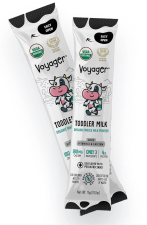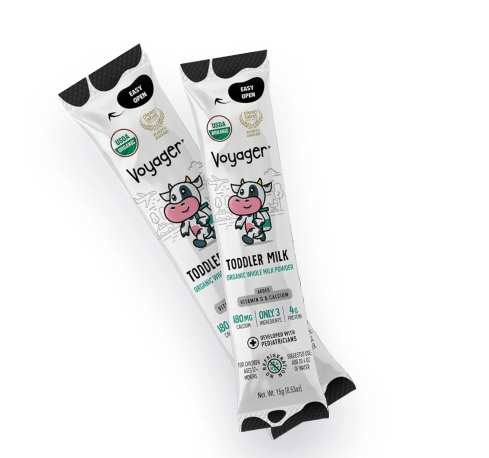
Common Digestive Issues in Toddlers and How to Ease Them
It is a common struggle for every parent to find that their once-cheerful toddler has become fussy, especially after meals. Their tiny tummies can become sensitive, especially during their fast-paced growth stages.
A mild discomfort may appear harmless; however, if the issues recur, it can disrupt their eating habits and overall health. Having a balanced approach to care and optimal nutrition can keep your child's digestion smooth and healthy.
The strategies we have shared today can help prevent or ease digestive issues in toddlers.
Frequent Toddler Tummy Troubles and How to Help
Occasional digestive hiccups are common in toddlers. Knowing the key reasons behind the issues can help parents ease their child's discomfort. So, here are some deeper insights into the common digestive issues and what approach you should take to help your toddler.
Constipation
The first in our charts is constipation, which is one of the most frequently recorded issues common in early childhood. The cause behind it might be a low fiber intake, transitions like toilet training or weaning, or dehydration. If you find that your toddler's stool has become dry and hard, it might be the reason for their bowel movement turning uncomfortable or infrequent.
What Parents Can Do
- Give your toddler fiber-rich foods such as whole grains, fruits, and veggies.
- Keep them hydrated by encouraging a lot of water intake throughout the day.
- Engage your toddler in physical activities, as it helps their intestines to move food freely.
- Give them a gentle tummy rub or a warm bath that adds to their relief.
Pro Tip: Several parents opt for organic toddler milk as it is formulated to help support their child’s nutrition. Since each child is different, parents might have to select an option that suits their toddler's needs and choices.
Diarrhea
Diarrhea is the other common concern for the parents. Sudden dietary changes, viral infections, food sensitivities, or the use of antibiotics typically cause the condition. If you notice your toddler passing frequent watery stools, it might lead to dehydration. So, the key here is to keep your child thoroughly hydrated at all times.
Remedies You Can Try
- Offer your child diluted juices or oral rehydration solutions for replacing lost fluids.
- Ensure to avoid sugary beverages, as they can worsen your toddler's condition.
- Try feeding them easy-to-digest foods such as rice, bananas, applesauce, and toast.
Pro Tip: If you plan for trips, then it is important to monitor your toddler's diet closely. Stay prepared with a toddler travel essentials checklist that will help you plan well for the trip. Packing proper snacks, clean water, and familiar foods can keep your toddler safe, preventing tummy upsets.
Gas and Bloating
Toddlers often experience gas and bloating. It mainly happens due to swallowing air when eating, overeating, or reactions towards certain foods.
Preventive Approaches
- Feed your child small and frequent meals, as it can help prevent overeating.
- Make your toddler eat slowly and chew properly.
- Make them burp after a meal to release trapped air.
Pro Tip: Ensure to monitor their responses to specific meals, as it will help you recognize the best things for your child's tummy.
Food Intolerances and Allergies
As a parent, you should know the difference between food intolerances and food allergies. Allergies typically involve the immune system, which might lead to rashes, swelling, or vomiting. And intolerances mainly impact the digestive system.
Signs of Food Intolerances or Allergies
- Bloating, gas, or stomach pain after eating food
- Skin rashes, eczema flare-ups, or mild swelling around the mouth
- Persistent diarrhea, vomiting, or unusual fussiness after meals
- Slower growth or poor appetite over time
What You Can Do
- Consult a pediatrician before you make any dietary changes.
- Implement an elimination diet under medical guidance to identify triggers.
- Replace foods that cause issues with safe, nutrient-rich alternatives.
Pro Tip: Learn everything about the difference between organic and conventional milk. Try choosing organic milk for your child, like Voyager Milk. It is thoughtfully formulated to meet the nutritional requirements of toddlers and made with care for growing children.
Tips for Better Digestion
Here are a couple of tips to ease your child's digestion and implement into your daily routines:
Balanced Nutrition
Choose a colorful diet that is rich in veggies, fruits, and whole grains. These key foods are a strong source of fiber and important nutrients that keep your toddler's digestive system functioning smoothly.
Probiotics and Prebiotics
Choose yogurt and fortified milk as they are rich sources of natural probiotics that improve good bacteria in your kid's gut. Besides prebiotics found in bananas, asparagus, and oats, which help feed those bacteria, there are other benefits to consider.
Right Milk Choice
As all milks vary in terms of composition and ingredients, parents can explore options that suit their child's preferences and diet. Voyager Milk is one option that is formulated to support the daily nutrition choices for toddlers.
Conclusion
Caring for your toddler's tummy is easy, especially if you are equipped with the tips that we have shared today. At Voyager Milk, we help parents to better care for their children's tummies and keep them healthy. Our carefully formulated toddler milk offers nourishment, helping your munchkin to feel comfortable and energized every day.
So, learn more about how Voyager Milk is made with care for growing toddlers. Contact us today to know more!
Frequently Asked Questions
1. What are the early signs of poor digestion in toddlers?
The earliest signs may be excessive burping, sudden loss of appetite, meal-time annoyances, and a noticeably distended or hard stomach.
2. Can teething affect my toddler’s digestion?
Teething may cause a toddler to swallow extra saliva, which may cause upset digestion, mild diarrhea, and temporary appetite changes which may upset digestion.
3. How can sleep impact my toddler’s digestive health?
Lack of or poor sleep may result in a sluggish metabolism, cause disruptions in gut motility, and lead to a bloated stomach and irregular bowel movements.
4. Are food portion sizes linked to toddler digestive comfort?
Yes. Oversized portions and overfeeding can cause discomfort, slow digestion, and fussiness because the digestive system is strained.
5. Can emotional stress affect a toddler’s stomach?
Stress and disrupted routines can cause digestive upset in a toddler because of the sensitive gut-brain connection.


